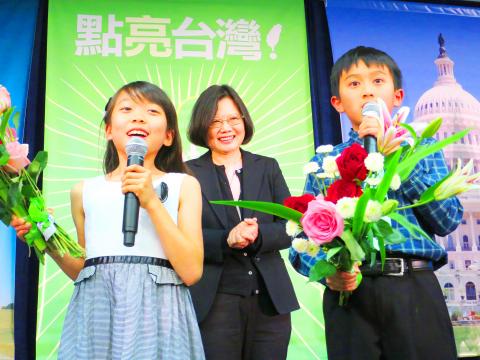Following a landmark visit to the White House on Wednesday, Democratic Progressive Party (DPP) Chairperson Tsai Ing-wen (蔡英文) met US Deputy Secretary of State Antony Blinken on Thursday, making her the first Taiwanese presidential candidate to have entered the US Department of State headquarters.
US Department of State officials said at a post-meeting press conference that they appreciated Tsai’s visit, during which she held “constructive” talks with US officials.
Based on the US’ “one China” policy — as stipulated in the Three Joint Communiques between Washington and Beijing and the US’ Taiwan Relations Act — the US has developed solid unofficial ties with Taiwan, the officials said.

Photo: Chen Hui-ping, Taipei Times
The US has committed to supporting Taiwan’s security, freedom from coercion and economic prosperity, while helping it attain dignity and respect in the international community, they added.
Tsai entered the Harry S. Truman Building — the US Department of State headquarters — in the company of DPP Secretary-General Joseph Wu (吳釗燮), DPP Legislator Hsiao Bi-khim (蕭美琴) and the party’s Washington liaison, Michael Fonte.
The meeting with Blinken lasted about an hour.
Asked if she felt the US government has “upgraded” its treatment of her compared with her visit in 2011, Tsai said: “This is a simple fact. I walked in [the building] and that is it.”
Tsai’s meeting with the US Special Assistant to the President and Senior Director for Asia Evan Medeiros at the White House on Wednesday has been seen as a major political breakthrough for Taiwan-US relations, as she was the first Taiwanese presidential candidate to have visited the White House — a privilege not granted to Tsai on her last visit in 2011, nor to President Ma Ying-jeou (馬英九), who visited Washington as then-Taipei mayor and KMT chairman in 2006, nor to former DPP chairman Frank Hsieh (謝長廷), who visited the US as the DPP presidential candidate in 2007.
Tsai on Wednesday also met with former US deputy secretary of state Richard Armitage and former assistant secretary of state for East Asian and Pacific affairs Randall Schriver.
Separately on Thursday, while addressing a dinner held for Taiwanese expatriates in Washington, Tsai said she does not need to have her qualifications evaluated in any other nation and needs only to answer to 23 million Taiwanese.
Tsai said that the purpose of her US visit is not to have a job interview, but to convey two messages — that Taiwanese will stick to a democratic and free lifestyle, and that she is responsible and determined to maintain peace and stability across the Taiwan Strait.
Tsai was responding to comments made earlier this week by Chinese Ambassador to the US Cui Tiankai (崔天凱).
Noting that some people have said Tsai’s visit is aimed at seeking Washington’s endorsement prior to January’s election, Cui said he wondered why she would talk to foreigners, but not directly to her compatriots on the other side of the Taiwan Strait.
Additional reporting by CNA

The combined effect of the monsoon, the outer rim of Typhoon Fengshen and a low-pressure system is expected to bring significant rainfall this week to various parts of the nation, the Central Weather Administration (CWA) said. The heaviest rain is expected to occur today and tomorrow, with torrential rain expected in Keelung’s north coast, Yilan and the mountainous regions of Taipei and New Taipei City, the CWA said. Rivers could rise rapidly, and residents should stay away from riverbanks and avoid going to the mountains or engaging in water activities, it said. Scattered showers are expected today in central and

COOPERATION: Taiwan is aligning closely with US strategic objectives on various matters, including China’s rare earths restrictions, the Ministry of Foreign Affairs said Taiwan could deal with China’s tightened export controls on rare earth metals by turning to “urban mining,” a researcher said yesterday. Rare earth metals, which are used in semiconductors and other electronic components, could be recovered from industrial or electronic waste to reduce reliance on imports, National Cheng Kung University Department of Resources Engineering professor Lee Cheng-han (李政翰) said. Despite their name, rare earth elements are not actually rare — their abundance in the Earth’s crust is relatively high, but they are dispersed, making extraction and refining energy-intensive and environmentally damaging, he said, adding that many countries have opted to

SUPPLY CHAIN: Taiwan’s advantages in the drone industry include rapid production capacity that is independent of Chinese-made parts, the economic ministry said The Executive Yuan yesterday approved plans to invest NT$44.2 billion (US$1.44 billion) into domestic production of uncrewed aerial vehicles over the next six years, bringing Taiwan’s output value to more than NT$40 billion by 2030 and making the nation Asia’s democratic hub for the drone supply chain. The proposed budget has NT$33.8 billion in new allocations and NT$10.43 billion in existing funds, the Ministry of Economic Affairs said. Under the new development program, the public sector would purchase nearly 100,000 drones, of which 50,898 would be for civil and government use, while 48,750 would be for national defense, it said. The Ministry of

UNITED: The other candidates congratulated Cheng on her win, saying they hoped the new chair could bring the party to victory in the elections next year and in 2028 Former Chinese Nationalist Party (KMT) lawmaker Cheng Li-wun (鄭麗文) yesterday won the party’s chair election with 65,122 votes, or 50.15 percent of the votes. It was the first time Cheng, 55, ran for the top KMT post, and she is the second woman to hold the post of chair, following Hung Hsiu-chu (洪秀柱), who served from 2016 to 2017. Cheng is to succeed incumbent Eric Chu (朱立倫) on Nov. 1 for a four-year term. Cheng said she has spoken with the other five candidates and pledged to maintain party unity, adding that the party would aim to win the elections next year and